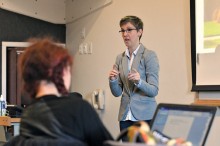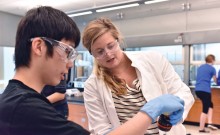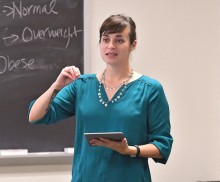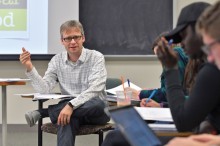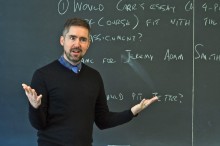Welcome, new tenure-track faculty
- Katherine Eskine, Assistant professor of psychology
- Lindsay Flynn, Assistant professor of political science
- Hilary Magruder Gaudet ’09, Assistant professor of chemistry
- Kate Mason, Assistant professor of sociology/women’s and gender studies
- Justin Schupp, Assistant professor of sociology
- Kent Shaw, Assistant professor of English
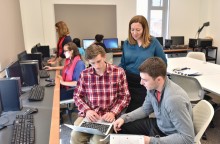 Katherine Eskine
Katherine Eskine
Assistant professor of psychology
Previous job: Assistant professor of psychology, Xavier University of Louisiana
My educational background: “I received my B.A. from the University of Montana. Then I worked for a few years as a neuroscience technician at Dartmouth College while learning valuable research skills for graduate school. In 2011, I earned my Ph.D. in cognition, brain, and behavior from The Graduate Center of the City University of New York.”
Why I became an educator: “My fifth grade teacher, Mr. McKnight, was an expert at what we now call active learning. In his class, we created countries to learn about government, had a model UN with another school to learn about politics, and participated in international competitions for creative problem solving to learn about science. I was enthralled by his class. Even then, I couldn’t imagine a nobler job than to grow passions in others. Solving problems, especially really hard problems, is extremely rewarding and I am so glad to have the privilege of helping others reap the rewards of learning and doing science.”
The focus of my scholarship: “I study how music affects cognition in healthy adults and people who suffer from dementia. Music influences many regions of the brain, is closely tied to our emotions, and is memorable. Many of us can easily sing entire pieces of music we haven’t heard in years. We can also use music as a way to remember information (the ABCs or all 50 states). For all these reasons, music is an excellent candidate to influence cognition. Specifically, I investigate the neurological correlates (using electroencephalography—EEG) of cognitive improvement resulting from music listening. I also examine the effects of music on the cognition of dementia patients and document any brain-related changes that underlie improvement.”
What led me to my field: “When I was 17, my father gave me the book The Man Who Mistook His Wife for a Hat by Oliver Sacks. It was the most fascinating book I had ever read. In the book, Oliver Sacks documented neurologic disorders like that of Mrs. S, a woman who only perceived half of her world (unilateral spatial neglect). She would only eat half of her plate of food and would only apply lipstick to half of her lips. It was the first time I had really considered how the brain shapes experience and vice versa. After reading this book, I knew I wanted to study the brain. Over the years my fascination with the brain melded with my hobby of playing music, landing me exactly where I am today, studying the effects of music on the brain.”
Why I chose Wheaton: “It’s a small liberal arts college (essential to a great education—in my view). Wheaton values science, supports student research, and cares about diversity. My colleagues are leaders in their fields, well-read, like to talk about research and science, and get a good brain joke. What else could you ask for? If I had to distill it down to a few things, I came to Wheaton because of its progressive view of education, commitment to students, and support of research.”
Most important lesson I learned in college: “The difference between reading and studying. The difference between a draft and a paper.”
What I want every student to learn: “Correlation is not causation. The nurture/nature debate is dead; genes and the environment interact—constantly.”
What few people know about me: “I was a synchronized swimmer from the age of 11 to 14. I play the trombone. I hiked 430 miles of the Appalachian Trail with my little sister when I turned 30.”
 Lindsay Flynn
Lindsay Flynn
Assistant professor of political science
My previous job: “For the last few years I have split my time between teaching at a public policy school and researching public policies under a grant in Luxembourg. I was a lecturer at the University of Virginia’s Frank Batten School of Leadership and Public Policy and a postdoctoral scholar at the LIS Cross-National Data Center in Luxembourg.”
My educational background: “I went to an undergraduate institution (Albion College) similar to Wheaton. I always appreciated the rapport that students and faculty had with one another, which contributed to my engagement with academic material. My graduate degrees are in government, with a focus on public policy.”
The focus of my scholarship: “My scholarship focuses on the similarities and differences in social policies across North America and Europe. In particular, I look at the ways in which institutional configurations influence behavior. Right now I am working on a book manuscript exploring the ways in which housing policies produce economic and social inequalities.”
Why I became an educator: “When I went to graduate school, I thought I wanted to work as a policy wonk (confession: as a kid I always wanted to work for the Census). That first year of graduate school I was awarded a teaching assistantship and I realized I loved being in the classroom—working with students as we grappled with thorny questions about equity and fairness, tracing how policies and institutions profoundly influence citizens’ lives, and realizing that everything is connected to everything else. Ultimately, I became an educator because the classroom is such an excellent place for the exchange of ideas.”
What led me to my field: “As an undergraduate, I studied abroad at New College at Oxford University. For my tutorial on comparative social policy, I wrote a ten-page paper every week. It was intense, but I was so fascinated by the topic that I took the GRE and started applying to graduate schools to study social policy. I guess the rest is history.”
Why I chose Wheaton: “My hope for a liberal arts school—that it is diverse, that students pursue knowledge and skills in order to become informed consumers and informed producers of information, and that faculty work together to build a community of scholars—aligns with Wheaton’s vision.”
Most important lesson I learned in college: “Staying up late does not make for good papers.”
What I want every student to learn: “I want students to develop a skill set that is adaptable to constantly changing environments. That involves approaching problems within an analytic framework, becoming critical thinkers, and caring about the community and world that we live in.”
What few people know about me: “I am a first-generation college student.”
 Hilary Magruder Gaudet ’09
Hilary Magruder Gaudet ’09
Assistant professor of chemistry
My previous job: “During the 2013–2014 academic year, while I was writing my dissertation, I was an adjunct laboratory instructor in chemistry at Wheaton. I was then a full-time visiting assistant professor in chemistry here from 2014–2016. In 2016, I was promoted to a tenure-track position as an assistant professor in chemistry.”
My educational background: “I graduated from Wheaton College in 2009. I double majored in biochemistry and psychology. I then when to graduate school at Brown University where I obtained my Ph.D. in medical science in 2014.”
Why I became an educator: “When I was an undergraduate student at Wheaton, I was a teaching assistant and tutor in chemistry. Then, at Brown, I was a TA for a virology course, where I had the opportunity to create and give lectures. I truly enjoyed the process. I loved engaging with the students during lectures. I also enjoyed the individual time I spent with the students during office hours. In my lab at Brown, I had the opportunity to individually mentor research students. It is wonderful to help my students grow and learn and I liked observing their development over time. Finally, I had the opportunity to act as an adjust laboratory instructor in chemistry at Wheaton during my final year of graduate school, which solidified my desire to become an educator.”
The focus of my scholarship: “At Brown, where I got my master’s degree and Ph.D., my research focused on estrogen signaling in breast cancer. Specifically, I studied a novel estrogen receptor, named G protein Estrogen Receptor, which may have implications in the treatment of breast cancer. Since coming to Wheaton, I have been studying the effects of methylmercury, a metalloestrogen that humans are exposed to in the environment, on breast cancer growth and progression. I use breast cancer cell lines in culture and zebrafish as models for this research. In addition, I am collaborating with a lab at Brown University to study the role of HE4, a protein involved in ovarian cancer, in the progression of ovarian cancer.”
What led me to my field: “I have always been interested in science. When I was in high school, I shadowed oncologists and became fascinated with oncology. As a student at Wheaton, I was awarded an American Cancer Society Fuller Fellowship to work with a research scientist at Brown University on breast cancer. This experience was the start of my career as a cancer researcher.”
Why I chose Wheaton: “I chose Wheaton because I was an undergraduate student at Wheaton and I absolutely love Wheaton. I love the small liberal arts college feel. As an undergraduate, I had close relationships with my professors. As a professor, I want to also have close relationships with my students and a small liberal arts college affords this opportunity.”
Most important lesson I learned in college: “I learned how to form solid professional relationships. The ability to form these relationships has had a huge impact on my success.”
What I want every student to learn: “I want every student to learn how to form professional relationships and how to network.”
What few people know about me: “I grew up in Newport, R.I. I am married and have two wild dogs, a husky and a lab. I love to ski, snowboard, wakeboard and run.”
 Kate Mason
Kate Mason
Assistant professor of sociology/women’s and gender studies
My previous job: Visiting assistant professor at Miami University in Ohio
My educational background: “I grew up in Massachusetts and went to Brown for my undergraduate degree. For my master’s degree and Ph.D., I headed west to attend the University of California, Berkeley.”
Why I became an educator: “I’ve always really, really loved school and learning. I had some amazing teachers and professors as I was growing up who encouraged my curiosity, made me feel comfortable taking risks and trusting my perspective, and gave me opportunities to do research of my own. I hope to do the same for my students. The best part, though, is that even though I’m on the other side of the table now, I still get to keep learning—from my students.”
The focus of my scholarship: “I’m a sociologist by training—that is, I study how societies work, how they affect their members, how they’re structured by spoken and unspoken rules and norms. A lot of sociological theory tends toward the abstract or intangible: you can’t touch a social norm, for example. I’m interested in how social rules and inequalities impact the physical body. How do we absorb ideas about good health or beauty, for example, or live with the effects of economic inequality? And how do those affect our physical well-being and life chances?”
What led me to my field: “I was a Chinese (East Asian studies) major in college at first, and then I added a double major in sociology. My early exposure to cultural norms different than my own made me aware of just how little our social roles, identities or expectations are ‘natural,’ and I became interested in questioning where those things come from.”
Why I chose Wheaton: “I’ve always loved the liberal arts college model that Wheaton exemplifies. The idea that students should be encouraged to pursue the things they’re curious about, rather than just training them for a career, is something I believe in strongly. Furthermore, the Wheaton students I met during my interview here were bright, creative and passionate—so when I got the call to offer me the position, I was thrilled to accept.”
Most important lesson I learned in college: “College is a time when, in your academic life, you should transition from being a consumer of knowledge toward becoming a producer of knowledge. I learned this when I worked as a research assistant to one of my professors. When he assigned me to summarize a book or run a statistical analysis of some data, he didn’t already know the answers; he was depending on me to work independently and teach him what I’d learned—I was the expert. That experience changed my outlook in later classes I took and projects I worked on. It encouraged me to trust my own judgment—picking topics and readings that would be most relevant to my interests—which, in turn, made whatever I was studying that much more interesting and meaningful for me.”
What I want every student to learn: “Taking intellectual risks brings the greatest rewards. Ask a question you don’t know the answer to. Find an interesting puzzle and dig into it—even if you’re not sure where you’re going. Take classes outside of your major.”
What few people know about me: “I am terrible at caring for plants and keeping them alive. Fortunately for my dog, Mac, this isn’t the case with pets.”
 Justin Schupp
Justin Schupp
Assistant professor of sociology
My previous job: Visiting assistant professor at Kenyon College, Gambier, Ohio
My educational background: “I’ve had the great pleasure of attending several different institutions during my undergraduate and graduate studies. I attended the University of Colorado and Colorado State University for undergrad. I graduated from CSU in 2005 with a bachelor’s degree in sociology. For graduate studies, I attended The Ohio State University. I earned a master’s degree in the rural sociology program in 2009 and a Ph.D. from the sociology department in 2014.”
The focus of my scholarship: “Much of my scholarship has looked at the intersections of social movement activity and inequality to examine how they influence/mitigate/perpetuate each other. Currently, a bulk of my research attention on these areas has looked at the case study of the local food movement. For example, I just finished a series of projects where I explored the neighborhood characteristics that play host to local food outlets to gain insight into the locations where these events happen most frequently. I’m working on a project that predicts the likelihood of a neighborhood being a food desert based on several characteristics of neighborhoods (for example, socioeconomic status, racial/ethnic composition) and the individuals that live within the area. In the past, I examined the barriers that prevent people from participating in self-provisioning activities.”
What led me to my field: “I think that I’ve had a soft spot for understanding as much as I can about the human experience since I was a little guy. For example, my dad and I attended numerous University of Colorado college football games when I was in grade school and I became very intrigued about how fans of opposite teams would interact with one another. I noted that one of the things that it really depended on was the quality of the opposing team, something that fans had little or no control over. This introduced to me the idea of things above and beyond any one individual—things sociologists call ‘social structure.’ As I moved into high school and college, I became very interested in bigger questions about humans and the environments that they live in, such as why were a few people really rich, whereas many others were barely getting by. I never really had a place to box all of these interests—until I walked into my first sociology class. I remember very distinctly falling in love with sociology within a couple of weeks because I felt this was the place that I could develop answers to the questions I had about the world.”
Why I became an educator: “There are few things in the world that I find more inspiring than the transmission of knowledge (i.e. it’s my inner geekdom). So, I was naturally drawn to being a part of this process as a educator.”
Why I chose Wheaton: “It was really actually pretty easy for me to pick Wheaton. I felt like this was an environment where both students and faculty were supported in their pursuits in the academy. Also, during my interview here I was very impressed by the sense of community that occurs amongst students themselves, but also amongst students and faculty. Lastly, one of the things that I enjoy the most about my position is getting to spend time with students in the classroom, but also during the research process. I felt that Wheaton would allow me to do both of these things.”
Most important lesson I learned in college: “Time management. To me, this is the most important skill to develop in college. There are so many different facets of college that one has to attend to not only academically, but also socially. Without careful management of time one can find oneself in big trouble pretty quickly.”
What I want every student to learn: “Given the multitude of backgrounds that we all come from, my hope is that students gain tools in my courses and through participation in research projects that allow them to see the world in a new way. I think that the ability to step out of one’s own experience and understand the social world from a different perspective is essential. In fact, I think this is one of the most important things that the undergraduate experience can help cultivate for a student.”
What few people know about me: “I love to eat as many different kinds of food that I can. However, I have what could best be explained as an anti-green thumb. I kill just about any plant I’m in charge of in the garden. I’m also a terrible cook. I would find a way to mess up a microwave dinner.”
 Kent Shaw
Kent Shaw
Assistant professor of English
My previous job: Assistant professor at West Virginia State University
My educational background: “I received my bachelor’s degree from University of Missouri, my MFA from Washington University in St. Louis, and my Ph.D. in creative writing and literature from the University of Houston.”
Why I became an educator: “During my training in the United States Navy nuclear program, I acted as a tutor for my classmates and for the classes following ours. I found great pleasure helping students understand the material we were required to learn. And I found I could be most helpful when talking them through more complex topics or procedures, finding novel ways to expand on that knowledge so that they could comprehend the material. I would say that one of my ambitions as an educator is always to search for new and surprising ways to introduce knowledge, so that it seems to fit with what students already understand.”
The focus of my scholarship: “Being both a poet and a critic, my focus is twofold. In my creative work, I have been putting the finishing touches on a manuscript of poems that interacts with the information culture of 21st century America and then explores the imaginative potential of it. Can a database be a site of beauty? Why not? My critical work is focused on a particular style of poetry. It is most notable for its ‘spoken’ qualities, and its often surreal imagery, as though the writer had just given up deciding what to say, and the imagination took over. My research argues that these spoken-type poems should be read in the more conventional way, as a verbal canvas. And they should be read as a speech act.”
What led me to my field: “I started writing stories when I was in the Navy. The stories weren’t really that great, partly because all I could do was think about what was happening at the end and beginning of all my paragraphs. When I started at my undergrad, I found out poems are not only obsessed with what happens at the ends and beginnings of lines, they are obsessed with every word. That was when I realized I needed to be writing poetry, not prose.”
Why I chose Wheaton: “I chose Wheaton, because there is a major in creative writing. And the department is interested in a writer who can teach poetry as creative writing, poetry as literature, and who can introduce technological literacy into the equation. When I interviewed for this job, I remember telling the provost that it almost felt as though this position was made for me. Lucky for me, Wheaton thought so, too.”
Most important lesson I learned in college: “I learned all the complexities the writer can bring into a poem. The other thing I learned was to give my studies time and space to really flourish. Any time I rushed through homework or a class project I never got out of it what I could have if I had really invested the time. The projects I committed to turned out to be something I still consider a real accomplishment.”
What I want every student to learn: “Everyone really does have this creative impulse in them. However, it’s not enough just to know that you’re creative. You have to give time and attention to activities and studies where you can exercise your creativity. And then, and perhaps this is really the thing I would want every student to learn, creativity begets more creativity.”
What few people know about me: “Since Jake Pavelka’s season of The Bachelor, I have watched every episode of The Bachelor, The Bachelorette, Bachelor Pad and Bachelor in Paradise, which is me admitting I am a solid citizen of #BachelorNation. In fact, the whole Bachelor franchise might be responsible for my wife and me being together.”

